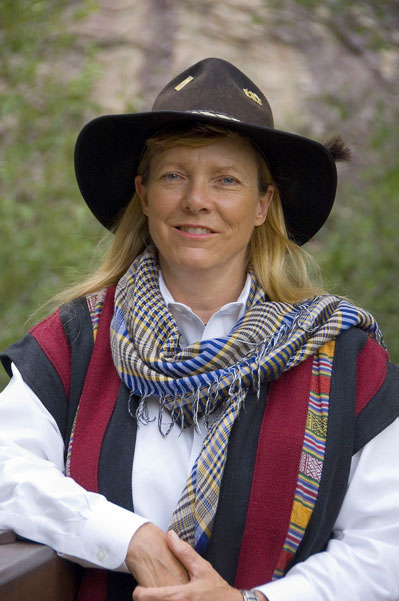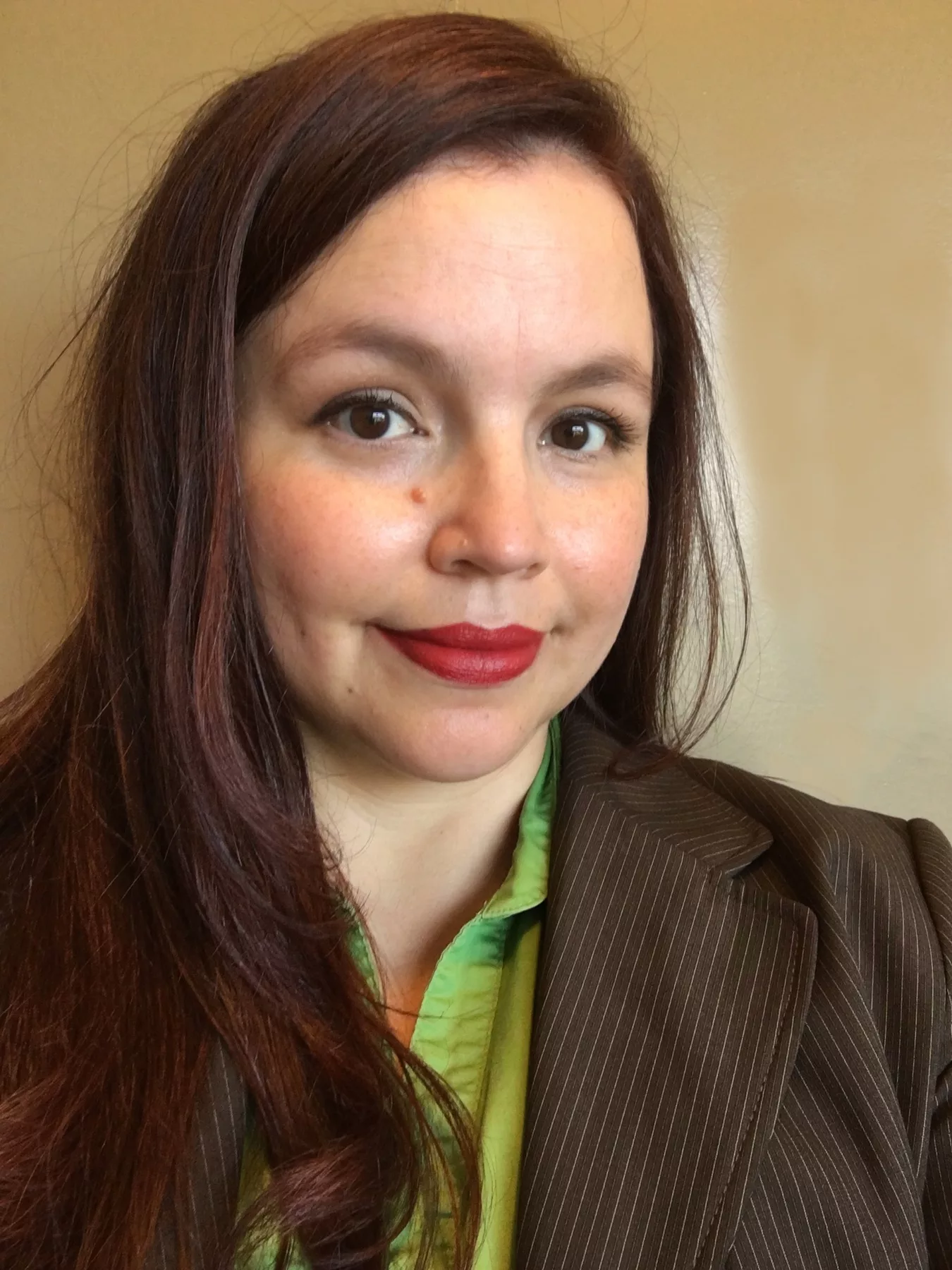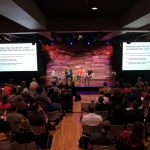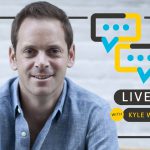Hunter Lovins’ message on climate change is both alarming and hopeful. Her keynote address at SOCAP17 gave many examples of the dire realities and risks of climate change, including the California wildfires, burning so close to Fort Mason during the conference that smoke hung in the air, thick enough to obscure the view of the Golden Gate Bridge. But Lovins, who was once named a “Hero of the Planet” by Time Magazine, also offered just as many concrete reasons for hope and examples of ways we can solve this challenge. She has a new book out coming this September called A Finer Future, that aims to lay out a new “blueprint” for humanity, leading away from collapse and towards a healthier and more secure planet that offers shared prosperity and meaningful lives for all.
SOCAP: You’ve said that we can solve climate change if we take action starting now. What is the most critical step you think needs to be taken immediately?
Hunter Lovins: We are in a horse race with catastrophe. The good news is that we are in the race. We have all the technologies we need to solve the worst of the problems facing us and figure out the solutions to the rest.
For three years prior to last year, global emissions had levelled off while global economic development was rising. Global GDP was going up (not that GDP is a good measure of wellbeing, but governments are sentimental about it.) Last year–in the rest of the world–that changed. It went back to emissions rising as GDP rose. In the US it did not. Emissions continued to flatten or decline in the US because of renewable energy. The rest of the world, largely China, burned a lot of coal.
The good news is that China knows it cannot continue to burn coal and is putting in place the technology to displace it. China is in this interesting situation where if they do not continue to deliver widespread prosperity, they are going to face revolution. So they flip flop back and forth between thinking:
We’ve got to run the economic engine just as hard as we can, and, Our people can’t breathe and until they’ve got clean air they are not going to feel that they have prosperity.
Last year China finished installing the solar capacity it had promised for 2020. China is leading the world now in installation of solar. They are adding, every year, more solar than Germany has in total. They continue to drive the price down, which is why our child-in-chief slapped tariffs on imports on behalf of a couple of US solar manufacturers, one of whom was already bankrupt because it failed to act when the Chinese went full bore at innovation.
I am a big fan of domestic manufacturing, and had the US supported our solar industry back when we invented the technology, we would be leading the world in solar. But, as with so many technologies, we let it go elsewhere.
Now, slapping tariffs on the Chinese is a very stupid thing to do. The good news there is that falling costs are roughly keeping pace with the tariffs so it’s not going to inhibit the spread of solar in this country all that much.
But this is no reason for complacency: If you put enough engines on it, you can get a bathtub airborne. You throw enough money at it you can get a coal and nuclear revival, as the administration has promised. But last year in this country more coal plants closed than in the entire eight years of the Obama administration. So they are not saving coal. And they can’t. Here in Colorado, back last fall, the big utility Xcel Energy put out an RFP for companies that could deliver electric capacity. The wind bids came in at under $0.02 a kilowatt hour. Solar came in at around $0.02 a kilowatt hour. Solar, plus wind, plus battery storage came in at around $0.03 a kilowatt hour. Everybody went, “What?” Just running a national gas plant, heretofore considered the cheapest, is around $0.04 to $0.06 a kilowatt hour.
And then the tariffs got slapped on. So Xcel said, bid again. We want to make sure these are real, that even with the tariffs you can still deliver this. The prices came back slightly higher, but there were still no bids for new fossil capacity that could compete with renewables plus storage.
Martin Luther said, “if I knew the world were going to end tomorrow, I’d plant a tree today.” You do things that you don’t think you are ever going to see the results of because they are still the right thing to do.
I’ve been in this field a very long time. (laughs) Long enough that if I were any damn good we would have solved these problems. I never thought I would live to see the transition. Martin Luther said, “if I knew the world were going to end tomorrow, I’d plant a tree today.” You do things that you don’t think you are ever going to see the results of because they are still the right thing to do. Now, I’m seeing it! We are living in the transition.
At the same time we have started rather late. Climate change is upon us. I use the term “global weirding.” The weather is weird everywhere. We never before had three category five hurricanes on the satellite screen at the same time in the Caribbean. And of course the people in Puerto Rico continue to struggle—thousands of them without power six months later. Before the winds stopped blowing, Elon Musk was shipping solar panels and Tesla walls to Puerto Rico. There are a number of other companies that are working in PR to build microgrids. Microgrids always should have been the answer. Puerto Rico’s bankrupt utility insisted on sticking with fossils. There is also a stupid FEMA rule that says that when you are doing restoration after a disaster, you can only build it back to the level it was at before. So FEMA is not helping. But there are a lot of microgrids going in in Puerto Rico. There are microgrids going in in Northern California after the big fires. We are starting to see people suddenly decide to get smart after these climate disasters. Will it be enough? I don’t know. Last June, Christiana Figueres, who led the world to a successful Paris Accord, Stefan Rahmstorf of the Potsdam Institute for Climate Impact Research, and a group of their colleagues released a report that stated we have until 2020 to turn around climate change (Three years to safeguard our climate). We really are up against it.
What the scientists are afraid of is runaway climate change. The arctic is warming. That is why we are getting “snow-mageddons” in Boston and New York. Big pulses of warm air go up into the arctic and push the cold air down over New England. When the arctic warms, you get methane burps. The permafrost starts to melt and all the trapped methane releases. Methane is a much worse greenhouse gas than carbon dioxide. Then you get into runaway climate change and meters of sea level rise and the spread northward of diseases and the end of agriculture and it gets very grim. Can humanity survive? I don’t know.
But again, we know how to stop climate change and do so profitably. We ought to get about it with alacrity.
SOCAP: What do you believe are the major stumbling blocks standing in the way of wide-scale progress on solving climate change right now? Do we need regulatory changes or an overhaul to our finance system or something else?
Hunter Lovins: In the US we are only going to get regulatory progress at the state and local level. I have great faith in cities. We are seeing mayors stepping up. I’m working now with the city of Fort Collins, which has initiated a climate economy. They are asking, how do we drive our prosperity by solving the climate crisis? How do we create jobs? Enhance livelihoods? How do we bring in entrepreneurs and companies that are solving climate change by implementing energy efficiency and renewable energy, as an economic development strategy. Los Angeles is looking at committing to 100% renewable energy. A thousand cities around the world have committed to this. So local government is one real source of hope.
Another is business. If we can show a business case for behaving more responsibly to people and planet, you don’t so much need the regulation. The business will do it because it is better business. Which is why I work with a lot of very large companies trying to help them grasp that this is just better business.
If we can move trillions of dollars from harm to healing, this will make a difference. So far we are moving millions. It needs to be billions and then trillions. But we are only just beginning.
Finance is going to be critically important. Where the money flows is where things happen. If we invest in the technologies of the last century, we are lost. But that is where most of the big finance has been. So a group of us got together and created a little company called Change Finance. Last fall we rang the bell on Wall Street to launch an exchange traded fund that is truly fossil fuel free. So far it is doing very well. If we can move trillions of dollars from harm to healing, this will make a difference. So far we are moving millions. It needs to be billions and then trillions. But we are only just beginning.
And things are about to get real interesting. Tony Seba is a Stanford professor who believes that the climate problem is solving itself. But in doing so, unless we manage the transition very carefully, it may just crash the economy. I’ve known Tony for over a decade. VERY smart entrepreneur. We made a video (Tony Seba: Clean Disruption – Energy & Transportation) when he was here in Colorado last June, profiling his book, Clean Disruption, in which he argues that by 2030 the world will inevitably be 100% renewable–for four reasons.
One, the dropping cost of solar. Last year the Saudis hit $0.017 a kilowatt hour. I’ve already mentioned the bids Xcel recently submitted in Colorado.
Two, the dropping cost of storage batteries. In the recent Xcel bidding in Colorado, solar plus storage was already cheaper than any fossil option that anybody was willing to bid. Elon Musk made his bet and built a 100 megawatt battery storage power plant in south Australia in 100 days. You cannot build a 100 megawatt coal plant in 100 days.
Three, the rise of the electric car. Last summer China announced that they are phasing out the internal combustion engine. That is ¼ of the world’s car market. Shortly thereafter, General Motors said “our future is electric.”
Four, the driverless car. Shortly after GM announced their future is electric, they also said they are introducing a ride-sharing service in 2019. Now the deal with this is, as Tony points out, autonomous electric vehicles cost one-tenth what you are paying now to own a private vehicle to get from here to there. If using TaaS (Transit as a Service) why on earth would you pay to buy, fuel, maintain, insure a private vehicle? They will go away.
If Tony is right, within 12 years we are looking at the dissolution in value, probably pretty complete dissolution, of the oil, coal, gas, uranium, nuclear utility, and auto industries, the banks that hold paper in these, and the insurance companies and pension funds that invest in them. My recent piece in Huffington Post walks through what we’re looking at. (The Clean Energy Transition Will Transform Our Economy Beyond Recognition).
This will be the mother of all disruptions—coming at us faster than we have any idea how to manage. By contrast, the 2008 mortgage collapse was over $2.7Trillion in stranded assets. We are looking at stranding…just the fossil assets are worth $20T to $30T on the books of companies like Exxon and countries like Venezuela. This is why Venezuela is now in collapse. They bet big on oil. And on bad management. But their entire national economy is based on oil. And oil prices.
If Tony is right, oil prices will not recover. You will see little spikes as we just recently did. But the competitive pressure on oil is going to drive the prices lower and lower and lower. But on current prices, solar competes with $25 a barrel oil. At that point, the oil companies are broke. But unless we have an alternative waiting in the wings, so is our economy.
SOCAP: What is your call to action to investors in the SOCAP community who want to help solve climate change?
Invest in companies like Change Finance. Invest in companies that have disruptive technologies that are needed either to provide for what we want as we exit the fossil era, or that will disrupt the fossil era. Investors typically say, I can’t invest in those—they aren’t proven. Most institutional investors say, I can’t buy the CHGX ETF. It hasn’t been around for three years. Well exactly! Now is the time to invest in these. If you want to drive change, don’t invest in what’s been around for years because it isn’t part of the solution. Change the way you invest if you want to preserve your capital. Again, if Tony is right this change is going to wipe out all of your conventional investments.
Change can happen very rapidly. I’m talking to you on a phone that fits in my pocket that is more powerful than the computer that put the guys on the moon. None of us had smartphones a decade ago. Most of us had landlines. I don’t have a landline now. Landlines are gone.
SOCAP: What is inspiring you most in your work right now. What is giving you hope?
Recently, with a group of wonderful colleagues, I helped launch The Wellbeing Economy Alliance (WEAll). (WE-All connects the Alliance for Sustainability and Prosperity, Next System Project, Leading for Well-Being, Global Alliance for Banking on Values, Economy for the Common Good, International Network, B Corps and many other networks and organizations). In the last three months since we launched, nobody is saying no. Everybody wants to be a part of this.
A lot of people are recognizing now is the time. Churchill said, “Americans can be counted on to do the right thing when they have exhausted all alternatives.” I think it’s true of the world. We are realizing that the way we have been doing things has brought us to the edge of a cliff. We are living in the time of edge economics. We need what David Brower called “the ecological U-turn.” When you are standing on the edge of a precipice, the only progressive move is to turn around and step forward.
I travel the world and I see it everywhere I go. People are realizing now is the time.
 Hunter Lovins is President of Natural Capitalism Solutions, an organization with a mission to educate senior decision-makers in business, government and civil society about how to implement more regenerative practices profitably. She is also a climate activist, professor of Sustainable Management at Bard MBA, author, and entrepreneur. She is a founding partner of Change Finance, which debuted The Change Finance Diversified Impact U.S. Large Cap Fossil Fuel Free ETF (the first 100% fossil free ETF) on the New York Stock Exchange in 2017.
Hunter Lovins is President of Natural Capitalism Solutions, an organization with a mission to educate senior decision-makers in business, government and civil society about how to implement more regenerative practices profitably. She is also a climate activist, professor of Sustainable Management at Bard MBA, author, and entrepreneur. She is a founding partner of Change Finance, which debuted The Change Finance Diversified Impact U.S. Large Cap Fossil Fuel Free ETF (the first 100% fossil free ETF) on the New York Stock Exchange in 2017.Photo Credit: Photo taken by Norm Clasen and published courtesy of Natural Capitalism Solutions.




